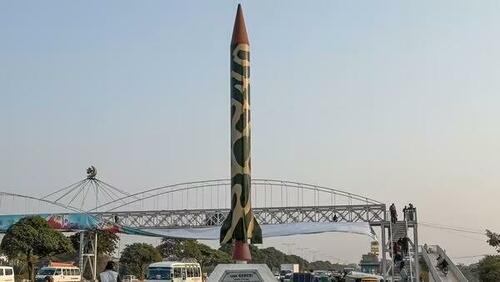Last week the United States imposed rare sanctions on Pakistan while condemning its nuclear-armed long-range ballistic-missile program. This despite Islamabad long being an uneasy ally of Washington.
The fresh sanctions on the missile sector were imposed under an executive order that "targets proliferators of weapons of mass destruction and their means of delivery," according to the State Department's Matthew Miller. The measures specifically punish Pakistan's National Development Complex and three defense firms.
In follow up this week, the Biden administration is warning that Pakistan is on the verge of achieving a long-range ballistic missile which is capable of striking the US mainland.
 AFP
AFPAccording to a Monday report in The Wall Street Journal:
Weeks before it leaves office, the Biden administration said that Pakistan is developing a long-range ballistic missile that could eventually provide nuclear-armed Islamabad with a weapon capable of striking the U.S.
The administration disclosed the intelligence about Pakistan’s secret missile activities and imposed sanctions against a state-owned entity involved in the work after repeated efforts to press its concerns in confidential channels fell short, U.S. officials said.
Pakistan's foreign ministry has rejected Washington's allegations, blasting them as "unfounded" and "devoid of rationality". Islamabad has further warned that this threatens the health of the "overall relationship" with the US.
American officials say that Pakistan's production of such a long-range ballistic missile is not necessarily imminent, but likely remains years away, or possibly up to a decade.
Still, Washington has launched a pressure campaign against a country which only twenty years ago was considered a 'major non-NATO ally'.
"We’re trying to build this pressure to get ahead of this problem because we don’t want Pakistan to go down this road so far that we are dealing with something that is more imminent," a Biden admin official was quoted in WSJ as saying.
Deputy national security adviser Jon Finer said last week "candidly, it is hard for us to see Pakistan’s actions as anything other than an emerging threat to the United States."
After recent sanctions imposed by the U.S. on #Pakistan’s long-range ballistic missile program.
— Pakistan Armed Forces News 🇵🇰 (@PakistanFauj) December 23, 2024
Social media users have shown overwhelming support for Pakistan’s #nuclear deterrence @OfficialDGISPR #PakistanArmy #Shaheen #ISPR pic.twitter.com/IgOEHI1jVN
The irony in all of this is that ever since Pakistan achieved status as a nuclear-armed power in the 1980s, Washington's chief concern has been its political and military stability, for which it has handed out billions in foreign aid to Islamabad over the many years.
But starting in 2018, then President Trump began cutting all military aid to the country. Relations have remained rocky and strained ever since. The Pentagon still says it cooperates with Pakistan's armed forces on the military level, however.
Source link

